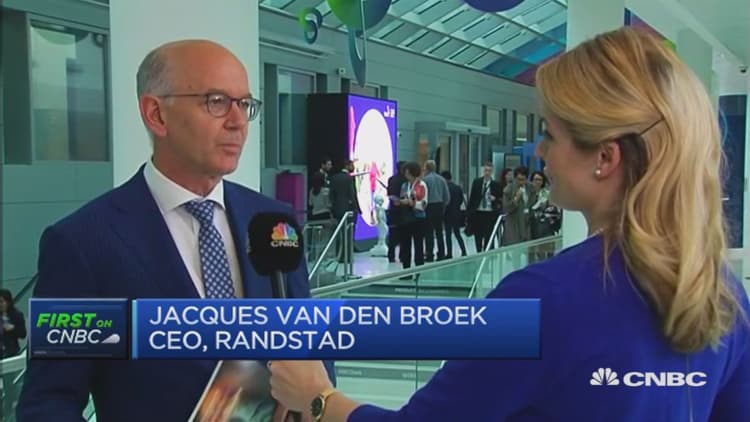It was a mixed picture for the euro zone on Tuesday with a slew of fresh data revealing that deflation had eased in the region but loans to households had failed to match expectations.
Euro area annual inflation came in at -0.1 percent for May, according to a flash estimate from Eurostat. The inflation figure was in line with a Reuters consensus forecast, and slightly higher than the -0.2 percent reading seen in April. However, the latest number is still are a far cry from the 2 percent inflation target set by the European Central Bank (ECB).
The new flash figure came as euro zone M3 growth — the figure which measures checking deposits, institutional money market funds and large liquid assets — was weaker than expected, down from 5 percent year-on-year in March to 4.6 percent in April.
That's bad news for the ECB, which has embarked on a massive asset-buying program that includes corporate bonds, cutting its main interest rate to zero and pushing its key bank deposit rate below zero.

It's worth noting that while household lending slowed, lending to European companies slightly improved, up 1.2 percent year-on-year in April, compared to 1.1 percent in March. Meanwhile, the area's jobless rate came in flat at 10.2 percent for April, as unemployment dropped by 63,000.
"April's euro-zone monetary data suggest that economic growth remains fairly slow. While the full effects of the ECB's expanded stimulus measures will not yet have been felt, we doubt that they will boost money and lending growth significantly," analysts at Capital Economics said in research note following the data release.
Meanwhile, Claus Vistesen, chief eurozone economist at Pantheon Macroeconomics, seemed relatively optimistic about inflation prospects in the months ahead in light of recovering oil prices.
"Overall, inflation pressures in the euro zone remain weak, but that will change soon as the year-over-year rate in energy prices normalizes," Vistesen said in an analyst note.
"The ECB, and investors, know this will happen but we still think markets and the central bank could get caught off-guard by the speed of normalization, even if the 2 percent 'target' remains elusive," Vistesen added.
'Now Europe's turn'
Jacques van den Broek, CEO of Randstad, told CNBC in Paris that after seeing steady improvement in the U.S, labor market, it's now Europe's turn.
"We do see Europe picking up...the French market is good for us, the Dutch market is good for us, Belgian, also Spanish and Italian," he noted.
"So in that sense we've seen a few good years out of the U.S, but now Europe is picking up speed, although not massively. So we're talking mid-single digit, a bit high single-digit growth there," ven den Broek said.

